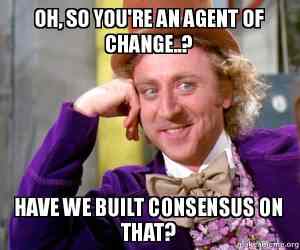Death to Buzzwords

I pray that there's a special rung in Hell, with an entire theme park of eternal pain awaiting whomever the asshat is that coined "impactful." Every time I hear it, I want to claw the eyes out of the speaker. Immersion in the unchecked cesspool of adulterated business jargon is one of the most loathsome aspects of my occupation.
If there was a real Orwellian Room 101, mine would contain a PC, with Outlook open (with Clippy, of course) to a never-ending, buzzword-laden email entitled "Socializing the Synergy." The Thought Police would put those A Clockwork Orange eye opener things in my head and I'd be compelled to read it until I succumbed.
That said, I appreciate that there are certain words appropriated as a sort of business "shorthand" shared among employees that are legitimate because they are more concise than other expressions, they have at least a modicum of onamonapia, and the act of using them appropriately instantly conveys that you are on the team. Medicine and military aviation are laden with such words because a worthy purpose is served when using them. You need to convey some information as concisely as possible and the florid expressions are so much greater than the sum of their parts. That's argot, and it works. "Circle the wagons meeting" is not, and it does not.
I got to thinking about the malignant proliferation of buzzwords in reading an opinion piece by André Spicer who is a professor of organizational behavior at City University of London. In it, he opined that buzzwords serve specific social purposes.
"Jargon is often used for what economists call 'signaling' in the workplace. Expensive packaging for products sends a signal that what is inside is high-quality. The latest business buzzwords are supposed to send a signal that the person using them is an up to date expert. Using buzzwords can make you look like you are an expert in an area you are not. It is easier to copy the language than to understand the deep knowledge behind it. Also we want to appear as if we are up-to-date. By using the latest buzzwords, we [show] that we are 'keeping up' - even thought our practices may not have changed. They can also signal you are part of the tribe. If everyone else is talking about 'thinking outside the box', then using that phrase shows that you fit in.
He continues:
"The problem is that general business jargon often covers up a lack of underlying knowledge about a particular issue. It is a way people can sound like they have nouse while simultaneously remaining vague and noncommittal."
I think he's right. I'm neither a grammar Nazi nor a diction snob, but I do pride myself on a functional vocabulary and I view the excessive use of buzzwords as proof the speaker does not. I admit to swooning when I hear someone utter sentences that don't end in prepositions. The Digital Age has harkened a dark era for the art of professional expression and I think we should value it more, if for no other reason than articulate corporate communication differentiates your product. Using words like "thought leader" and "change agent" in your LinkedIn profile makes me think you're trying to conceal the fact that you're unemployed.
Musings of an Aging Workhorse

